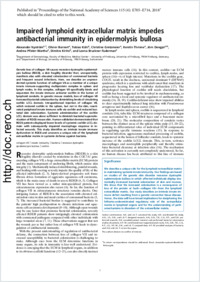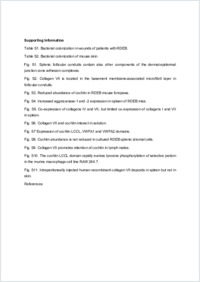Impaired lymphoid extracellular matrix impedes antibacterial immunity in epidermolysis bullosa
- Nyström, Alexander Department of Dermatology, Faculty of Medicine, Medical Center – University of Freiburg, Freiburg, Germany
- Bornert, Olivier Department of Dermatology, Faculty of Medicine, Medical Center – University of Freiburg, Freiburg, Germany
- Kühl, Tobias Department of Dermatology, Faculty of Medicine, Medical Center – University of Freiburg, Freiburg, Germany
- Gretzmeier, Christine Department of Dermatology, Faculty of Medicine, Medical Center – University of Freiburg, Freiburg, Germany
- Thriene, Kerstin Department of Dermatology, Faculty of Medicine, Medical Center – University of Freiburg, Freiburg, Germany
- Dengjel, Jörn Department of Dermatology, Faculty of Medicine, Medical Center – University of Freiburg, Freiburg, Germany
- Pfister-Wartha, Andrea Department of Dermatology, Faculty of Medicine, Medical Center – University of Freiburg, Freiburg, Germany
- Kiritsi, Dimitra Department of Dermatology, Faculty of Medicine, Medical Center – University of Freiburg, Freiburg, Germany
- Bruckner-Tuderman, Leena Department of Dermatology, Faculty of Medicine, Medical Center – University of Freiburg, Freiburg, Germany
-
23.01.2018
Published in:
- Proceedings of the National Academy of Sciences. - 2018, vol. 115, no. 4, p. E705–E714
English
Genetic loss of collagen VII causes recessive dystrophic epidermolysis bullosa (RDEB), a skin fragility disorder that, unexpectedly, manifests also with elevated colonization of commensal bacteria and frequent wound infections. Here, we describe an unprecedented systemic function of collagen VII as a member of a unique innate immune-supporting multiprotein complex in spleen and lymph nodes. In this complex, collagen VII specifically binds and sequesters the innate immune activator cochlin in the lumen of lymphoid conduits. In genetic mouse models, loss of collagen VII increased bacterial colonization by diminishing levels of circulating cochlin LCCL domain. Intraperitoneal injection of collagen VII, which restored cochlin in the spleen, but not in the skin, reactivated peripheral innate immune cells via cochlin and reduced bacterial skin colonization. Systemic administration of the cochlin LCCL domain was alone sufficient to diminish bacterial supercolonization of RDEB mouse skin. Human validation demonstrated that RDEB patients displayed lower levels of systemic cochlin LCCL domain with subsequently impaired macrophage response in infected wounds. This study identifies an intrinsic innate immune dysfunction in RDEB and uncovers a unique role of the lymphoid extracellular matrix in systemic defense against bacteria.
- Faculty
- Faculté des sciences et de médecine
- Department
- Département de Biologie
- Language
-
- English
- Classification
- Biological sciences
- License
-
License undefined
- Identifiers
-
- RERO DOC 306697
- DOI 10.1073/pnas.1709111115
- Persistent URL
- https://folia.unifr.ch/unifr/documents/306248
Other files
Statistics
Document views: 125
File downloads:
- pdf: 204
- Supplementary material: 168

